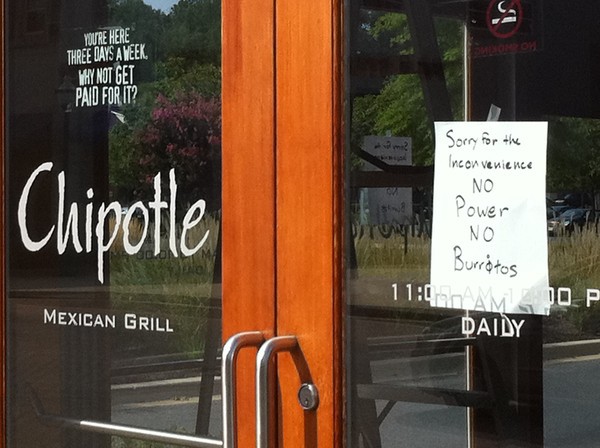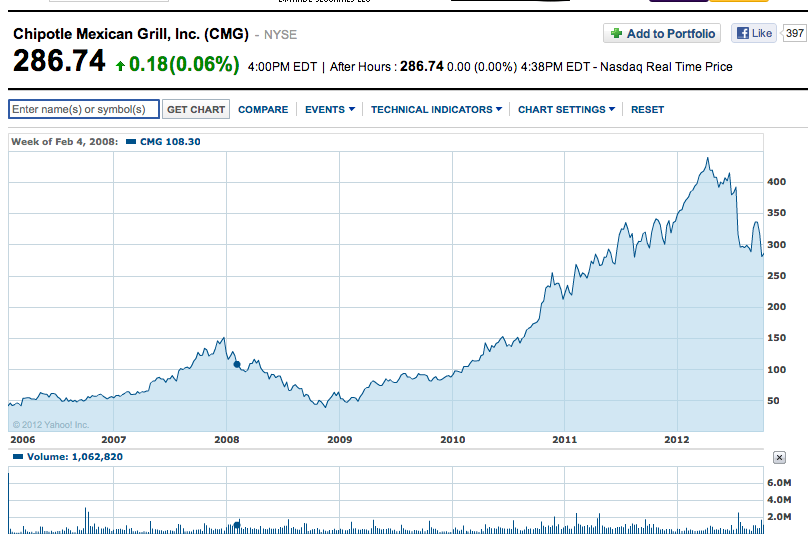You folks are never going to learn, are you? By “you folks” we mean the investing public, never ones to be dissuaded by a tight sweater or hair extensions. (Or for a corresponding example, an Xtreme Couture shirt and a neck tattoo.)
Our latest entrant in the irrational exuberance category, Chipotle Mexican Grill. The first few chapters of Chipotle history were a classic success story worth emulating. The company opened its 1st store in 1993, and opened its 2nd
- 2 years later,
- using the cash flow from the 1st.
Chipotle didn’t expand for the sake of expanding. It didn’t develop an appetite for franchise fees, saturating the market and abandoning quality control. It grew modestly, as you do.
There’s a common misconception that Chipotle originated as a brand of McDonald’s. Not quite. McDonald’s became a minority investor 3 years after that 2nd store opened, and within another 3 became Chipotle’s largest shareholder. With the resources of one of America’s healthiest corporations behind it, only then did Chipotle start growing exponentially and forever casting off its humble Denver origins.
And then, the initial public offering. January 2006, $42.40. Which is about where CMG stayed for the 1st year.
Look at the chart, which comprises CMG stock’s entire history. Notice anything unusual about it? Not that we encourage technical analysis over fundamental analysis here, but again, regard the chart.
It’s a fractal! The movement from inception through 2007 is a smaller version of the movement from the start of 2009 through April of this year (when the stock hit its zenith of $442.40.) We’ve already been on this ride before, the one where Chipotle loses ¾ of its value. This time around, the stock has lost only 35% of its value.
That includes a 7% drop in 5 minutes. The company has the Department of Labor assailing it from one side (for hiring illegals, or more precisely for hiring illegals while not being a union shop or a proud political contributor.) On the other side are venture capitalists selling off their institutional holdings. Unless you were prescient enough to have loaded up on Chipotle when it bottomed out the first time, which you weren’t, you’re probably looking to bail out.
Chipotle trades at 34 times earnings. It’s profitable, but not crazily so. What do we have here, fundamentally?
- A company that provides what’s on one hand a necessity (sustenance), but on the other, a luxury. (We’re in a protracted recession, remember? You can make your own burritos, perhaps in less time than it takes to wait for one if your local Chipotle has an exceptionally busy lunch hour.)
- A company with competitors that make an almost indistinguishable and indistinguishably priced product. (Qdoba, Moe’s Southwest Grill.)
- The market leader, which isn’t necessarily a good thing:
Chipotle operates 1310 stores throughout the United States and Canada (and another half dozen in the United Kingdom and France.) Revenue is about $4700 per store, per day. Qdoba has half as many locations, Moe’s half of that, and Baja Fresh slightly fewer than that. The subject of our post can only sustain so much more growth.
Are there any barriers to entry? If you’ve got a) the phone number of a grocery wholesaler and b) a kitchen, you’re a potential Chipotle competitor.
Chipotle is a $9 billion company if you measure by market capitalization, what its stock is worth. It’s a $1 billion company if you measure by stockholder equity, the difference between accounting assets and liabilities. To us, that’s a company that’s overvalued by something approaching a factor of 9.
The food is better than Taco Bell’s. That’s not the point. This isn’t about winning consumer accolades. It’s about showing profitability and the potential for growth. Goofing on the food at McDonald’s is the go-to material for hack comedians everywhere, but In-N-Out didn’t turn a $5½ billion profit with a 20% margin last year.
Ask your average CMG stockholder which he thinks the stock will do first: hit $430 (a 50% jump), or $191.16 (a 50% reduction.) It’s obvious, isn’t it? We’re now at the point where mathematical inevitability will trump all the investor confidence in the world.
Believe it or not, we don’t follow the movements of 5000+ publicly traded securities every single day. We don’t even follow market sectors all that closely. But a $400 price tag for a seemingly unremarkable stock got our attention. Was that merely a function of the IPO, the company just originally deciding to have divided itself into a small number of shares in the first place? No. Did Chipotle figure out a way to dramatically reduce costs? (Unless you count hiring illegals, no. And the company’s habit of rounding checks to the nearest nickel doesn’t quite count as “dramatic”.)
Have you bought lunch at McKesson recently? Has Cardinal Health ever caught your eye with a wacky promotional and/or advertising campaign? The questions are rhetorical, but the balance sheets are hearteningly real. If you’re going to buy stocks, research like crazy and don’t lose sight of the goal – making money, rather than patronizing businesses you have an emotional affinity for. And if you have no clue how to get started, don’t just buy our book, but read the free e-book that accompanies it if you buy it on our site.






